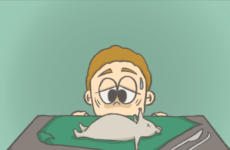Picture this: a student has been withdrawing from their friends. They spend most of their time in their room and have lost a significant amount of weight. Instead of being their light-hearted self, they have been sulking around school, even missing their classes. Last week, a sizable bruise appeared on their leg, but they said they tripped on the Humanities stairs. However, there are clear signs that they are self-harming. There is even reason to believe they have turned to drugs to heal the pain. If a teacher is told about his situation, the friend might get in trouble for the use of illegal substances. However, if nothing is done about the situation, they might continue to inflict self pain. What can be done?
The answer is to get the friend the help that he or she deserves by any means possible. One of the plethora of resources available to students on campus is the Assessment Team. The Assessment Team is composed of 14 juniors and seniors who act as liaisons for students to counseling. The faculty advisor, Ms. Judith Bender, is the Associate Director of the Counseling Center and leads meetings so that they function appropriately and efficiently. Students refer their friends to members of the assessment team who then bring up individual cases to their peers at weekly meetings. Other members frequently add information, and collectively, the group decides whether or not to reach out to the student. It usually ends with an email from Ms. Bender to the student and a conversation to ensure that they are doing okay.
A lot of student cases may not be as obvious as the scenario described above. However, there is no need to wait until a situation becomes life or death to refer a peer to the A Team. As stated by Ms. Bender, “Referrals to the A Team have covered almost every aspect of life at Choate–substance use, eating concerns, relationship problems, harassment, cheating, problems at home, isolation from the community, poor self-image, and diminished feelings of self-worth.” Choate is a stressful environment; if you think someone in the Choate community is struggling, get them help.
Although a vital resource in the community, the A Team has been grossly underutilized for the past few years. This is primarily because of various myths and misconceptions that have formed due to students being under-informed about the A Team and its functions. Students question whether or not their classmate’s problem is bad enough, if their friend will find out that they referred them, and if their friend will get in trouble or sent home. However, each referral given to a member of the A Team remains confidential to the group and that information does not leave the room. Other than the member that you spoke to, you will even remain anonymous to other A Team members if you choose to make a referral. In addition, it is a non-disciplinary group, meaning that neither you nor your friend will get in trouble if you’ve been breaking school rules. As stated by a member of the A Team, Katie Lee ‘18, “We’re here to listen and to bring students help, not to discipline anyone. You shouldn’t have to bear the burden of your friends problems when they can get professional help.”
Ms. Bender described the A Team as a group that is “of the students and for the students”. Donessa Colley ‘18 commented, “I’m a part of the Assessment Team because I know how hard Choate can be and how hard it can be when you see that your friend is suffering but don’t know what to do. I joined because I wanted to be a part of a program that works to do good around campus.”
Remember, don’t wait if you think you have a friend in a tough situation. The purpose of the A Team is to take the burden off of your shoulders and to keep the community as safe as possible. To make a referral, approach any member of the Assessment Team in person, by email, or through social media.




